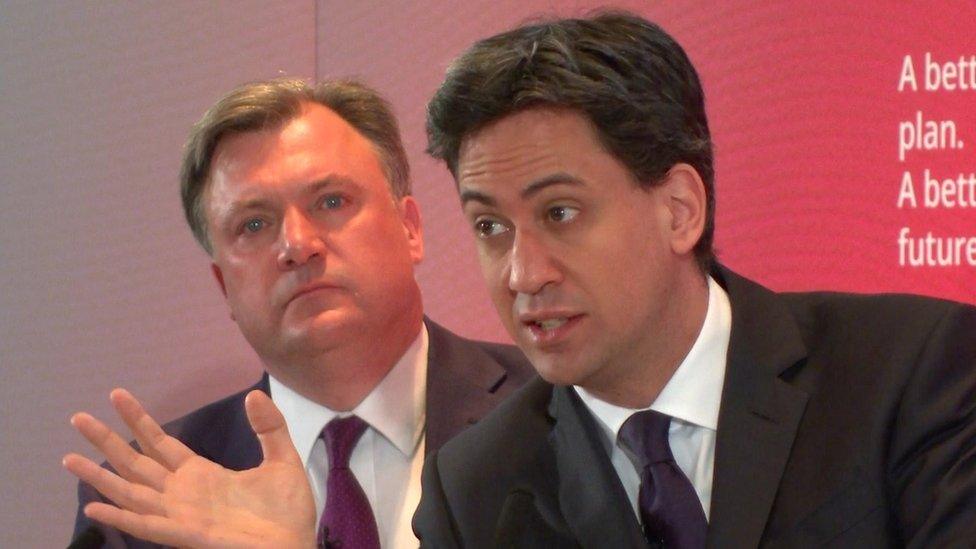Election 2015: Conservatives promise law to curb tax rises
- Published
"No increase in VAT, no increase in National Insurance, no increase in income tax", pledges David Cameron
David Cameron has vowed to introduce a law guaranteeing no rise in income tax rates, VAT or national insurance before 2020 if the Tories win the election.
The Conservative leader said workers already paid enough tax and he would focus on other ways of clearing the deficit, such as reducing the welfare bill and tackling tax avoidance.
Labour said it was a "last-minute gimmick" and it expected VAT to rise.
Ed Miliband suggested the Tories have a "secret plan" to cut tax credits.
The Lib Dems said voters would "simply not believe" the pledge unless the Conservatives spelled out where they would cut public spending.
Elsewhere in the election campaign:
Campaigning comedian Russell Brand has published a video of his interview with Labour leader Ed Miliband
Liberal Democrat leader Nick Clegg said a £12,500 personal tax allowance would be a "red line" for his party in post-election negotiations
UKIP leader Nigel Farage gave a speech in the European Parliament attacking what he said was a common EU migration policy
The SNP might win all 59 seats in Scotland, according to analysis of the latest opinion poll from Ipsos-Mori
A decision not to renew the UK's Trident nuclear submarines could threaten "the survival of our nation", 20 ex-military officials say in a letter to The Times newspaper
Both the Conservatives and Labour are focusing on economic issues with just over a week to go until polling day and with opinion polls suggesting neither has been able to open up a decisive lead.

Analysis by Political Editor Nick Robinson
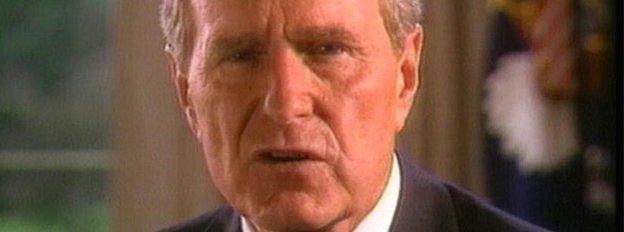
George HW Bush famously said "read my lips, no new taxes" in 1988
History is littered with politicians promising - or appearing to promise - that they can re-write the rules of economics and then being forced to gag on their own words. It's not that these leaders are fools - far from it. Even as they uttered those words George Bush Senior and Gordon Brown must have been thinking "fingers crossed".

As well as ruling out rises in headline tax rates, Mr Cameron said VAT would not be extended to new items and the upper earnings limit on national insurance will be aligned with the higher rate threshold for income tax.
The prime minister said he could make the difficult decisions needed to balance the public finances through spending cuts, reducing government waste and clamping down on tax avoidance "without reaching into the pockets of hard-working people and taking their money".
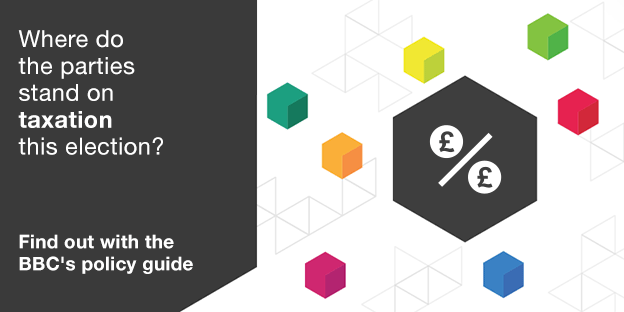
"Why can I make this pledge? I have seen the books," he told workers at a factory in Birmingham. "I know what needs to be done.
"Working people in this country have paid enough tax. As this economy recovers, I want you to be able to keep more of the money to spend as you choose. That is the choice. Take home pay going up with the Conservatives.... or going down with Labour."
The Conservative-Lib Dem coalition government raised VAT from 17.5% to 20% in 2011 despite the Conservatives saying they had no plans to do so before the 2010 election.

Analysis by Economics Editor Robert Peston
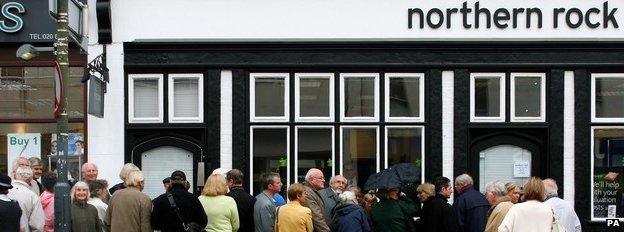
The Conservatives say their strategy is predicated on preparing the economy for future shocks
In most British people's minds, the great crash and recession of 2008 probably feels like yesterday - the defining economic shock of our age, we continue to live with its noxious effects. But the Tories and Labour are today behaving as if the risk of another such shock in the current parliament is nil, because in different ways they've both limited their room to offset the impact of one.

But senior Conservatives have said the economy is in a far stronger position now and their strategy means the UK will be able to withstand future economic shocks without the need for tax rises.
But Labour said the tax pledge could easily be reversed by Parliament in the future, arguing that the Conservatives had legislated to balance the books by 2015 but had failed to do so.
"These promises from David Cameron are two a penny," shadow chancellor Ed Balls told Radio 4's Today Programme.
Liberal Democrat Danny Alexander: "There are massive cuts that they [Conservatives] are refusing to spell out"
Mr Balls said he doubted the Conservatives could meet their target of eliminating the current deficit by 2017-8 without raising VAT, since they had been unable to provide any details of their proposed £12bn cuts to welfare - a key element of their deficit strategy.
"The Tories will raise VAT to make their sums adds up while my sums already add up," Mr Balls said.
Labour has said it will raise the top rate of tax from 45p to 50p but ruled out any hike in VAT or national insurance.
The Lib Dems said the Conservatives were "deflecting attention from the fact that they have abandoned the plan followed by the coalition and instead want to slash and burn support for millions of families".
"Until the Tories actually come clean with people about the savings they really want to make, people will simply not believe this sort of pledge because George Osborne has simply not made his sums add up," said their economics spokesman Danny Alexander.
Before the 2010 election, the Conservatives attacked Labour for passing legislation requiring the government to meet specific targets on borrowing and debt, saying it was "vacuous and irrelevant".
George Osborne, who was then shadow chancellor, said his counterpart Alistair Darling "does not trust himself to secure sound public finances, or he knows that the public do not trust him to secure them", claiming that Nigeria was the only other country to have a "fiscal responsibility act".
Speaking on BBC Radio 4's PM, Paul Johnson, of the Institute for Fiscal Studies, said none of the main parties had presented a "sensible long-term strategy" for the tax system.
He said: "None of them are talking about sorting out the problems with council tax still being based on property values 25 years ago.
"None of them are trying to sort out the fact that we tax income and earnings and capital gains and profits at completely different rates, which creates all these opportunities for tax avoidance.
"None of them is talking about integrating... the fact that we have this separate income tax system called national insurance contributions with the other system."
- Published29 April 2015
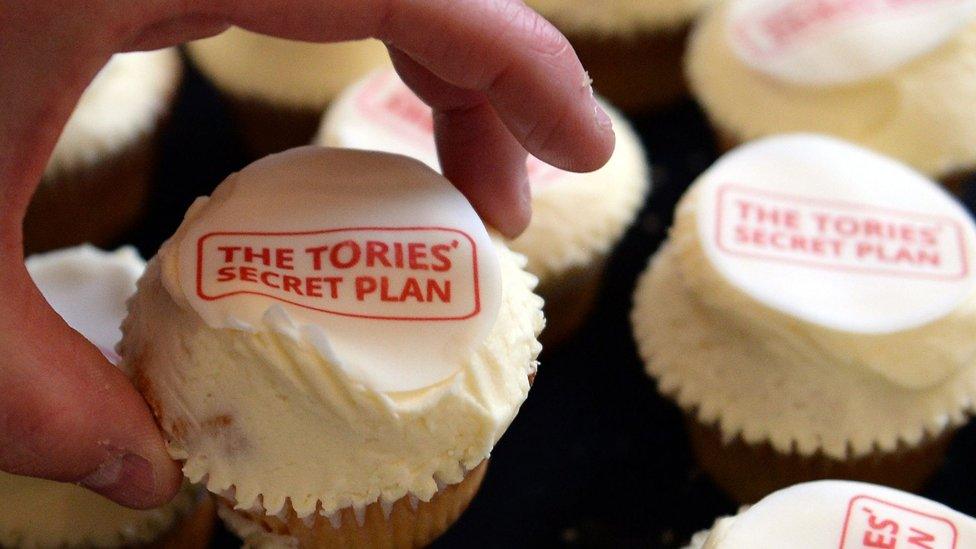
- Published29 April 2015
- Published29 April 2015
